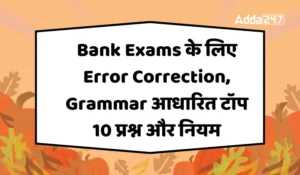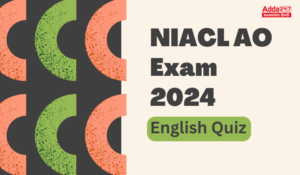IBPS SO Exam is a g and a lot of aspirants are heading towards new hopes with this upcoming opportunity. Thus, the English Language can be an impetus for their success by helping them save crucial time and score good points in lesser time and effort. So, instead of boiling the ocean, try building up a strong vocabulary, an effective knowledge of grammar, and efficient comprehension skills so as to be on the ball to face this particular section. Here is a quiz on English Language being provided by Adda247 to let you practice the best of latest pattern English Questions for upcoming IBPS SO Exam.
Direction (1-8): In the passage given below there are blanks which are numbered from 1 to 8. They are to be filled with the options given below the passage against each of the respective numbers. Find out the appropriate word in each case which can most suitably complete the sentence without altering its meaning.
Q1. A total of 1.5 million Indian troops ......(1)........ in the Indian Army during the First World War. Sailing away from the great seaports of India from 1914 under the British, for four years they fought for the ......(2)........ in Europe, Africa and Asia against the Germans and Turks. As cavalrymen they charged through French fields of corn with lances lowered; as marines they ……(3)……..the oceans; as engineers they built bridges across rivers in the jungles of Tanzania; as infantrymen they …….(4)……. trenches in China; as secret agents they stole over the Himalayas into Central Asia; as prisoners of war they lost years of their lives to .....(5)........ in Germany, Iraq, Syria and Turkey. The Indian Army in fact served in what are now some 50 countries, more than any other army of 1914-18. The war was truly global, and no body of men knew it more than the Indian ........(6).......After the Allies’ Armistice with Germany 100 years ago to end the war, the white soldiers of the Western nations often put down their guns to pick up their pens. Winston Churchill, Siegfried Sassoon and many others wrote bestselling war ......(7)......, novels, histories and plays. But the Indians barely did the same.A tiny minority of the Indian soldiers did write diaries and memoirs of their war. They were well-educated and ......(8)....... to come from the big cities or rich aristocratic families, such as Thakur Amar Singh, a Rajput officer who wrote possibly the longest diary in the English language, covering his war experiences in Europe and elsewhere.
create
segregate
protect
served
dead
Solution:
'Served' fits in correctly in the blank making it contextually correct and meaningful.
Q2. A total of 1.5 million Indian troops ......(1)........ in the Indian Army during the First World War. Sailing away from the great seaports of India from 1914 under the British, for four years they fought for the ......(2)........ in Europe, Africa and Asia against the Germans and Turks. As cavalrymen they charged through French fields of corn with lances lowered; as marines they ……(3)……..the oceans; as engineers they built bridges across rivers in the jungles of Tanzania; as infantrymen they …….(4)……. trenches in China; as secret agents they stole over the Himalayas into Central Asia; as prisoners of war they lost years of their lives to .....(5)........ in Germany, Iraq, Syria and Turkey. The Indian Army in fact served in what are now some 50 countries, more than any other army of 1914-18. The war was truly global, and no body of men knew it more than the Indian ........(6).......After the Allies’ Armistice with Germany 100 years ago to end the war, the white soldiers of the Western nations often put down their guns to pick up their pens. Winston Churchill, Siegfried Sassoon and many others wrote bestselling war ......(7)......, novels, histories and plays. But the Indians barely did the same.A tiny minority of the Indian soldiers did write diaries and memoirs of their war. They were well-educated and ......(8)....... to come from the big cities or rich aristocratic families, such as Thakur Amar Singh, a Rajput officer who wrote possibly the longest diary in the English language, covering his war experiences in Europe and elsewhere.
Allies
culprit
armed
service
Both (b) and (c)
Solution:
'Ally' here means a state formally cooperating with another for a military or other purposes and 'allies' is the plural form of 'ally'.
Q3. A total of 1.5 million Indian troops ......(1)........ in the Indian Army during the First World War. Sailing away from the great seaports of India from 1914 under the British, for four years they fought for the ......(2)........ in Europe, Africa and Asia against the Germans and Turks. As cavalrymen they charged through French fields of corn with lances lowered; as marines they ……(3)……..the oceans; as engineers they built bridges across rivers in the jungles of Tanzania; as infantrymen they …….(4)……. trenches in China; as secret agents they stole over the Himalayas into Central Asia; as prisoners of war they lost years of their lives to .....(5)........ in Germany, Iraq, Syria and Turkey. The Indian Army in fact served in what are now some 50 countries, more than any other army of 1914-18. The war was truly global, and no body of men knew it more than the Indian ........(6).......After the Allies’ Armistice with Germany 100 years ago to end the war, the white soldiers of the Western nations often put down their guns to pick up their pens. Winston Churchill, Siegfried Sassoon and many others wrote bestselling war ......(7)......, novels, histories and plays. But the Indians barely did the same.A tiny minority of the Indian soldiers did write diaries and memoirs of their war. They were well-educated and ......(8)....... to come from the big cities or rich aristocratic families, such as Thakur Amar Singh, a Rajput officer who wrote possibly the longest diary in the English language, covering his war experiences in Europe and elsewhere.
walked
drowned
skimmed
restored
sailed
Solution:
'Sailed' is correct in context of 'oceans'.
Q4. A total of 1.5 million Indian troops ......(1)........ in the Indian Army during the First World War. Sailing away from the great seaports of India from 1914 under the British, for four years they fought for the ......(2)........ in Europe, Africa and Asia against the Germans and Turks. As cavalrymen they charged through French fields of corn with lances lowered; as marines they ……(3)……..the oceans; as engineers they built bridges across rivers in the jungles of Tanzania; as infantrymen they …….(4)……. trenches in China; as secret agents they stole over the Himalayas into Central Asia; as prisoners of war they lost years of their lives to .....(5)........ in Germany, Iraq, Syria and Turkey. The Indian Army in fact served in what are now some 50 countries, more than any other army of 1914-18. The war was truly global, and no body of men knew it more than the Indian ........(6).......After the Allies’ Armistice with Germany 100 years ago to end the war, the white soldiers of the Western nations often put down their guns to pick up their pens. Winston Churchill, Siegfried Sassoon and many others wrote bestselling war ......(7)......, novels, histories and plays. But the Indians barely did the same.A tiny minority of the Indian soldiers did write diaries and memoirs of their war. They were well-educated and ......(8)....... to come from the big cities or rich aristocratic families, such as Thakur Amar Singh, a Rajput officer who wrote possibly the longest diary in the English language, covering his war experiences in Europe and elsewhere.
force
dug
dig
cover
Both (b) and (d)
Solution:
'Trench' means a long, narrow ditch. Hence, 'dug' is correct in context of 'trenches'.
Q5. A total of 1.5 million Indian troops ......(1)........ in the Indian Army during the First World War. Sailing away from the great seaports of India from 1914 under the British, for four years they fought for the ......(2)........ in Europe, Africa and Asia against the Germans and Turks. As cavalrymen they charged through French fields of corn with lances lowered; as marines they ……(3)……..the oceans; as engineers they built bridges across rivers in the jungles of Tanzania; as infantrymen they …….(4)……. trenches in China; as secret agents they stole over the Himalayas into Central Asia; as prisoners of war they lost years of their lives to .....(5)........ in Germany, Iraq, Syria and Turkey. The Indian Army in fact served in what are now some 50 countries, more than any other army of 1914-18. The war was truly global, and no body of men knew it more than the Indian ........(6).......After the Allies’ Armistice with Germany 100 years ago to end the war, the white soldiers of the Western nations often put down their guns to pick up their pens. Winston Churchill, Siegfried Sassoon and many others wrote bestselling war ......(7)......, novels, histories and plays. But the Indians barely did the same.A tiny minority of the Indian soldiers did write diaries and memoirs of their war. They were well-educated and ......(8)....... to come from the big cities or rich aristocratic families, such as Thakur Amar Singh, a Rajput officer who wrote possibly the longest diary in the English language, covering his war experiences in Europe and elsewhere.
combustion
captivity
prisoner
escapers
majority
Solution:
'Captivity' means the condition of being imprisoned or confined.
Q6. A total of 1.5 million Indian troops ......(1)........ in the Indian Army during the First World War. Sailing away from the great seaports of India from 1914 under the British, for four years they fought for the ......(2)........ in Europe, Africa and Asia against the Germans and Turks. As cavalrymen they charged through French fields of corn with lances lowered; as marines they ……(3)……..the oceans; as engineers they built bridges across rivers in the jungles of Tanzania; as infantrymen they …….(4)……. trenches in China; as secret agents they stole over the Himalayas into Central Asia; as prisoners of war they lost years of their lives to .....(5)........ in Germany, Iraq, Syria and Turkey. The Indian Army in fact served in what are now some 50 countries, more than any other army of 1914-18. The war was truly global, and no body of men knew it more than the Indian ........(6).......After the Allies’ Armistice with Germany 100 years ago to end the war, the white soldiers of the Western nations often put down their guns to pick up their pens. Winston Churchill, Siegfried Sassoon and many others wrote bestselling war ......(7)......, novels, histories and plays. But the Indians barely did the same.A tiny minority of the Indian soldiers did write diaries and memoirs of their war. They were well-educated and ......(8)....... to come from the big cities or rich aristocratic families, such as Thakur Amar Singh, a Rajput officer who wrote possibly the longest diary in the English language, covering his war experiences in Europe and elsewhere.
ranks
tanks
guides
troops
camps
Solution:
The passage is about army and in this context 'troops' will be the correct choice here.
Q7. A total of 1.5 million Indian troops ......(1)........ in the Indian Army during the First World War. Sailing away from the great seaports of India from 1914 under the British, for four years they fought for the ......(2)........ in Europe, Africa and Asia against the Germans and Turks. As cavalrymen they charged through French fields of corn with lances lowered; as marines they ……(3)……..the oceans; as engineers they built bridges across rivers in the jungles of Tanzania; as infantrymen they …….(4)……. trenches in China; as secret agents they stole over the Himalayas into Central Asia; as prisoners of war they lost years of their lives to .....(5)........ in Germany, Iraq, Syria and Turkey. The Indian Army in fact served in what are now some 50 countries, more than any other army of 1914-18. The war was truly global, and no body of men knew it more than the Indian ........(6).......After the Allies’ Armistice with Germany 100 years ago to end the war, the white soldiers of the Western nations often put down their guns to pick up their pens. Winston Churchill, Siegfried Sassoon and many others wrote bestselling war ......(7)......, novels, histories and plays. But the Indians barely did the same.A tiny minority of the Indian soldiers did write diaries and memoirs of their war. They were well-educated and ......(8)....... to come from the big cities or rich aristocratic families, such as Thakur Amar Singh, a Rajput officer who wrote possibly the longest diary in the English language, covering his war experiences in Europe and elsewhere.
story
rage
memoirs
minutes
Both (c) and (d)
Solution:
'Memoirs' means a historical account or biography written from personal knowledge. So, it is the correct choice.
Q8. A total of 1.5 million Indian troops ......(1)........ in the Indian Army during the First World War. Sailing away from the great seaports of India from 1914 under the British, for four years they fought for the ......(2)........ in Europe, Africa and Asia against the Germans and Turks. As cavalrymen they charged through French fields of corn with lances lowered; as marines they ……(3)……..the oceans; as engineers they built bridges across rivers in the jungles of Tanzania; as infantrymen they …….(4)……. trenches in China; as secret agents they stole over the Himalayas into Central Asia; as prisoners of war they lost years of their lives to .....(5)........ in Germany, Iraq, Syria and Turkey. The Indian Army in fact served in what are now some 50 countries, more than any other army of 1914-18. The war was truly global, and no body of men knew it more than the Indian ........(6).......After the Allies’ Armistice with Germany 100 years ago to end the war, the white soldiers of the Western nations often put down their guns to pick up their pens. Winston Churchill, Siegfried Sassoon and many others wrote bestselling war ......(7)......, novels, histories and plays. But the Indians barely did the same.A tiny minority of the Indian soldiers did write diaries and memoirs of their war. They were well-educated and ......(8)....... to come from the big cities or rich aristocratic families, such as Thakur Amar Singh, a Rajput officer who wrote possibly the longest diary in the English language, covering his war experiences in Europe and elsewhere.
allowed
designate
arranged
tended
hampered
Solution:
'Tended' is grammatically and contextually correct here.
Directions (9-15): Read each of the following sentences to find out if there is any grammatical error in it. The error, if any, will be in one part of the sentence. The number (A, B, C or D) of this part is your answer. If there is no error in the statement, then mark option (e) as your answer choice.
Q9. From the outside, Bangladesh appears a country where (A)/ democratic stability has been ushered economic (B)/ progress and shed the ‘basket case’ tag (C)/ carried since its birth in 1971./(D) No Error /(E)
A
B
C
D
E
Solution:
Remove 'been' and only 'has ushered' will be correct here.
Q10. Bangladesh no longer makes news for mass deaths from famines, cyclones and floods, (A)/ and is ahead of neighbours India and Pakistan on human (B)/ development index, including life expectancy, maternal and (C)/ child mortality, rural poverty and food security. /(D) No Error /(E)
A
B
C
D
E
Solution:
No Error
Q11. The Sirisena-Rajapaksa camp has, (A)/ expectedly, welcomed fresh elections, (B)/ claiming it would reflect the (C)/ true willing of the people. /(D) No Error /(E)
A
B
C
D
E
Solution:
'Will' here is a noun meaning a deliberate or fixed desire or intention and hence use of 'willing' is incorrect here.
Q12. Across India’s agrarian plains, plantations (A)/ and orchards, millions of birds, bats and insects toil to (B)/pollination crops. However, many of these (C)/ thousands of species may be in dangerous decline. /(D) No Error /(E)
A
B
C
D
E
Solution:
'To' will take first form of verb. So, 'pollinate' will replace 'pollination'.
Q13. The decline of moths, bees, butterflies, hoverflies and other pollinators (A)/ is undeniably linked to human activity: large tracts of natural (B)/habitats have been clear for monoculture cultivation, while the use (C)/ of pesticides and fertilisers is pushing out nature’s little helpers. ./(D) No Error /(E)
A
B
C
D
E
Solution:
Use 'cleared' in place of 'clear'.
Q14. In a series of studies at the University of Calcutta, researchers have (A)/ showed that native Indian bees, when exposed to multiple pesticides, (B)/ suffer from memory and olfactory impairment, lower response rates, (C)/ and oxidative stress which damages cells. ./(D) No Error /(E)
A
B
C
D
E
Solution:
No Error
Q15. Despite of the recent announcement suggesting that the Jaipur Zika (A)/ virus strains cannot cause foetal microcephaly, (B)/ all possible measures to control transmission (C)/ and monitor pregnancies should be taken. /(D) No Error /(E)
A
B
C
D
E
Solution:
'Despite' is never followed by 'of'. Hence, error is in part A of the sentence.
- Tips and Tricks To Solve Reading Comprehension
- Tips and Tricks to Solve Coherent Paragraph| Odd Sentence out
- 5 Tips and Tricks To Solve New Pattern Cloze Test
Test where you stand in the Competition with Online Test Series to get 30% Off Today |
|
|---|---|
|
Get Classroom at Your Fingertips with Video Courses to get 30% Off Today |
Enroll in LIVE BATCHES to get 20% Off Today |
|
Get Latest Printed Edition BOOKS to get 20% Off Today |
Study Anytime with eBOOKS
|






 Practice for English Section: 15 Cloze T...
Practice for English Section: 15 Cloze T...
 Bank Exams के लिए Error Correction, Gram...
Bank Exams के लिए Error Correction, Gram...
 English Quiz For NIACL AO Mains 2024 Exa...
English Quiz For NIACL AO Mains 2024 Exa...










